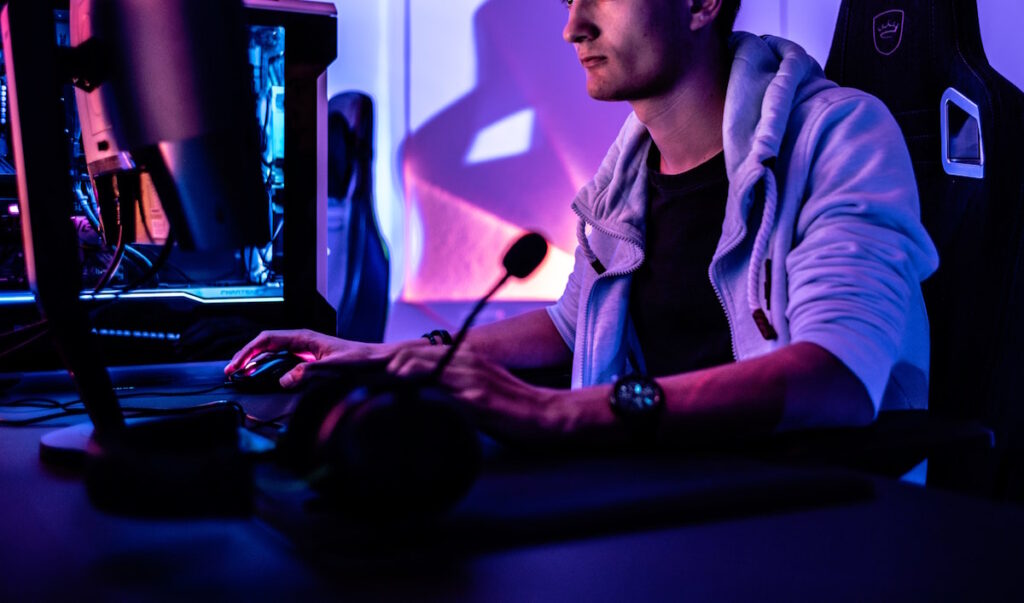A number of high profile sports stars are open about being avid gamers. Athletes who play video games on the regular include Paul George (NBA) and Chuck LidDell (UFC) while the MLB has even released a list of the top gamers in their league. NFL’s Cam Newton has battled fans on Twitch, while NBA All-Star Damien Lillard has been championing for a new boxing video game to come to market.
Of course, none of this should come as a surprise. From amateur and collegiate to the professional level, athletes are just like us as far as recreational interests are concerned. Why shouldn’t they enjoy the likes of Overwatch, GTA, and the hordes of eSports releases as a means to release tensions from their day-to-day responsibilities? On the surface there’s certainly nothing wrong with it. That said, in addition to physical distinctions from the average person, many competitive athletes have a unique behavioral construct. A recent qualitative study identified many motivations for why the behavioral patterns required to excel at sports may be embedded in common experiences found within video games. As such, some hypothesize that they may be more vulnerable to mental health concerns connected to gaming. Furthermore, chronic gaming could have an adverse effect on athletic performance.
Below is a breakdown of common questions surrounding athlete gaming and behavioral health, and whether or not steps can or should be taken to address risk.
4 Pressing Questions About Whether or Not Frequent Video Game Play Could Compromise Athlete Performance and Mental Health
Is it Bad to Play Video Games Before Sports?
Popular research suggests that regular gaming can be beneficial for hand-eye coordination and reaction time. But do these benefits translate to the court, track, field, rink, or other competitive sporting arena? Dr. Marco Cardinale who is the Head of Sports, Science and Research of the British Olympic Association doesn’t believe so. He has stated that gaming before competition could instead be detrimental to athlete performance. Cardinale states that the detriment is due to poor quality of sleep. Research consistently shows that gaming for even one hour per day can result in reduced sleep quality, fatigue, insomnia symptoms, and delayed bedtimes and wake times. Given that the data driven importance of sleep for athletic performance cannot be overstated, there is a direct line to be drawn here. Timing appears to be key. It may be a good idea to put the controller down one or two nights before competition. And no, it’s probably not OK to pick it back up on game-day no matter how well one slept. A study of Brazilian professional soccer players found that playing video games right before matches appeared to impair on-field decision-making performance involving accuracy. This implies an athlete can absorb higher levels of mental fatigue during time of play in their sport because they have already spent some of this energy on less important / casual play activities.
Are Athletes More Vulnerable to Gaming Disorder?
Research has already shown that athletes are more prone to gambling disorder when compared to the general population. Is the same true for gaming disorder?
Gaming disorder (or video game disorder) has been recognized by the World Health Organization in its latest International Classification of Diseases. Moreover, the American Psychiatric Association has included Internet Gaming Disorder in the section of the Diagnostic and Statistical Manual of Mental Disorders (DSM-5) which requires further research before being elevated to the status of a full diagnosis. To date, there are upwards of 231 million active gamers in the U.S.. Studies find that 1.4% to 7.3% are designated as addicted or problem gamers (respectively), although the measurement of what constitutes an addiction to games does currently vary from study to study. So, if athletes are more prone to be playing games for additional competition, leisure, or relaxation, there is cause for further investigation if effective services can be offered to this population.
We can draw upon some of the same gaming motivations that make competitive athletes more vulnerable to gambling disorder to draw general conclusions about a predisposition to gaming disorder. High levels of energy and commitment, expectations of winning despite the odds, quest for perfectionism, and a unrelenting willingness to make sacrifices to achieve victory are among them. Recent research has indeed found an association of problematic video gaming in elite male athletes, so additional research is strongly recommended. Finding ways to achieve healthy leisure activities which help the athlete connect with their drives for mastery and competition are potential alternatives if video games become an unhealthy outlet for their personal time.
Can Athletes Play Video Games?
Unlike with gambling, most leagues and organizations in the USA have no rules in place to restrict athlete gaming. Overseas, football clubs such as Manchester United have consulted behavioral health experts on the matter and have considered a ban on player video game play on match days. But let’s not forget that Manchester (City) once banned players from having sex after midnight. Ultimately, a pre-game gaming ban is a hard rule to enforce on our side of the pond, and one that cannot be done without invading privacy.
Should Athletes Play Video Games?
Athletes are ultimately responsible for their own self-regulation and exclusion if need be. If an individual experiences sleep disruption and other symptoms and there is a measurable impact on athletic performance – the athlete should not engage in game play, in-season.
Otherwise, there’s no other logical reason competitive athletes should be restricted from casual game play unless they have an existing mental health diagnosis which connects with their gaming activities (as per above). If you are concerned about whether or not you or a sportsperson in your league has a gaming disorder please complete this gaming test. If the results indicate a potential issue, leverage the gaming disorder services of Kindbridge Behavioral Health. All it takes to get started is a simple and confidential phone call to +1 (877) 426-4258 or email to [email protected].

